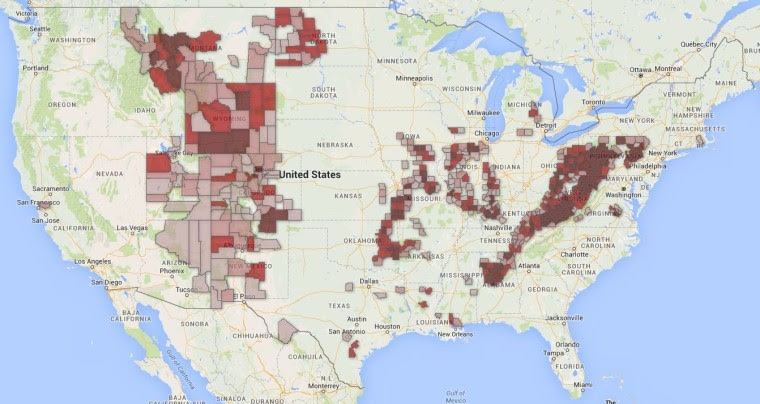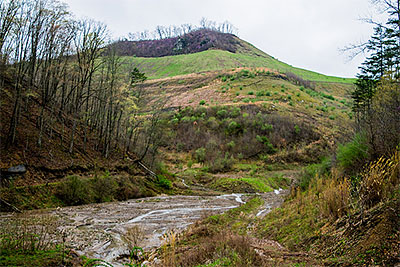News
.jpg)
The National Academy of Sciences is undertaking a review of existing research on links between mountaintop removal coal mining and health risks. The review is funded by the federal Office of Surface Mining Reclamation and Enforcement in response to a request from the state of West Virginia. As part of the review, the NAS is hosting public meetings to gather information from impacted communities.
AÂ public comment meeting will be held on Monday, Aug. 21st from 6:30 to 9 p.m. at the Perry County Public Library in Hazard, Ky.
On Tuesday, Aug. 22, the NAS will host a panel of scientists and state regulators in Lexington, Ky. This session will be from 12:45 to 5:00 p.m. at the Griffin Gate Marriott and is open to the public.
You are welcome to join either session, but attending the public comment session on Monday will be most impactful. You are not required to speak, but we encourage you to do so. If you have been directly impacted by mining, consider sharing information you have, such as well water data, air pollution issues or personal health impacts.
Representatives from member groups of The Alliance for Appalachia and allies will be attending. We will be available on Monday at 5:30 p.m. to provide suggested talking points to those who want to speak during the town hall.
Can’t attend the meetings? Submit your comments online today!
No comments yet » Leave your own...

The darker the red, the greater the extend of remaining abandoned mines. Image: The Daily Yonder.
The RECLAIM Act is going to a vote before the House Natural Resources Committee TOMORROW. Despite having shown no interest in the legislation over past the past two years, corporate coal interests have launched an all-out assault to kill the bill in the past few days.
We can’t let corporate interests steal this opportunity from folks trying to build a bright future for their home. The RECLAIM Act would create thousands of jobs in communities struggling with the decline of the coal industry. RECLAIM is sponsored by Congressman Hal Rogers (R-KY) and a bipartisan set of cosponsors.
The legislation would use $1 billion sitting idle in Washington to put people to work cleaning up abandoned coal mines.
It could also spur the reuse of reclaimed mines for development projects that would diversify local economies, like this agriculture project in West Virginia. But the current bill language needs to be strengthened in order to catalyze economic projects like these. Representative Don Beyer will offer an amendment on Tuesday to strengthen the bill.
RECLAIM would be funded through a $2.5 billion federal fund that has been financed by the coal industry over the past 40 years. The RECLAIMAct doesn’t use a cent of taxpayer money. It imposes no new fees or taxes, and has no impact on the coal industry. The RECLAIM Act uses existing funds to create jobs and clean up dangerous mines.
It’s a win-win-win. We know it. You know it. Now it’s time to let Congress know it, too.
Before it’s too late, call and show your support!
Call 1-347-269-4100
Tell your representative:
“The RECLAIM Act would create thousands of jobs in struggling communities. Vote yes on the RECLAIM Act– and the Beyer amendment– tomorrow. If you don’t serve on the Natural Resources Committee, share your support with Chairman Bishop.”
1 Comment » Leave your own...
Coal mining giant Consol has been illegally destroying streams in Southwestern Pennsylvania with its longwall mining practices for years, and the Center for Coalfield Justice (CCJ) been fighting them in court every step of the way.
Now, on the eve of a major court decision on CCJ’s appeal of its mining permits, the company is worried it might lose. Its response? Just change the law to make it legal for them to destroy streams as long as they promise to try to restore them. We cannot let this happen.
Are you a Pennsylvania resident? Tell your Senator to oppose SB 624, which would create an exemption to the PA Clean Streams Law so that longwall mining companies can profit!
Currently, the Mining Law requires companies to abide by the Clean Streams Law and do everything possible to avoid predicted pollution and other stream damage in the first place.  This bill would make it legal for longwall mines to predict and cause subsidence that results in total flow loss in streams, killing all aquatic life and eliminating recreational uses.  The “restoration” process is not always successful, and is itself a highly destructive construction project that eliminates stream uses and habitat.
Don’t let mining companies destroy public natural resources for private profit. Tell your Senator to oppose SB 624.
Consol could use alternative coal mining practices that prevent subsidence under streams and create more jobs.  But it chooses not to because it alleges these methods are less profitable.  Meanwhile, our communities suffer the consequences. Not even state parks are safe from the company’s greed, as it is pushing for permission to destroy streams within Ryerson Station State Park. We’ve prevented that so far, but if we want to prevail we cannot allow any special exemptions to the Clean Streams Law.
Thank you for protecting our streams, parks, and communities!
 Veronica Coptis
Veronica Coptis
Center for Coalfield Justice
Learn about CCJ and other iLoveMountains / Alliance for Appalachia partners
1 Comment » Leave your own...

The Stream Protection Rule was developed by the Office of Surface Mining Reclamation and Enforcement (OSMRE) over the course of seven years during the Obama administration. The rulemaking was an effort to better protect public waterways from mountaintop removal and other destructive coal mining practices. The rule would have updated the 1983 Stream Buffer Zone Rule.
OSMRE considered new scientific studies regarding water quality and other impacts of coal mining across the country. The main purpose of the new rule was to better protect public water from the impacts of mountaintop removal and longwall underground mining. Both mining practices are particular to Appalachia, and can devastate streams by burying headwater streams under rubble, or dewatering streams when underground mines collapse.
OSMRE held many public hearings regarding the draft rule and heard comments from citizens, environmental groups and the mining industry. The final rule was extensive, covering stream impacts, as well as reclamation and monitoring requirements. But it was also moderate, and would not have ended mountaintop removal or valley filling.
The rule took effect in January 2017, but was revoked by Congress in February through the Congressional Review Act. President Trump signed the legislation rescinding the rule, and the 1983 version is now once again in effect.
While rivers and streams near coal mining sites have some protections under the old rule, as well as various requirements under the Clean Water Act, none have been sufficient to fully protect public water from coal mining pollution. Alliance groups and their allies will continue to pursue all means of protecting public water, including citizen enforcement of existing rules, and implementation of new state and federal regulations.
2 Comments » Leave your own...
 We have a chance to defeat a 2,000-acre mountaintop removal permit owned by Alpha Natural Resources. The permit was first issued in 2008 but no mining activity has occurred. Federal law states that a permit “shall terminate” if mining has not begun within three years of the permit being issued.
We have a chance to defeat a 2,000-acre mountaintop removal permit owned by Alpha Natural Resources. The permit was first issued in 2008 but no mining activity has occurred. Federal law states that a permit “shall terminate” if mining has not begun within three years of the permit being issued.
Urge the West Virginia Department of Environmental Protection to revoke the Eagle 2 permit.
Coal River Mountain Watch requested that the West Virginia Department of Environmental Protection (DEP) terminate the Eagle 2 permit, prompting the department to instead retroactively grant Alpha an extension, in clear violation of the law. The federal Office of Surface Mining Reclamation and Enforcement (OSMRE) affirmed the DEP’s action.
Fortunately, a federal judge vacated OSMRE’s decision and compelled the agency to reconsider terminating the permit in light of evidence spelled out in a lawsuit brought by Coal River Mountain Watch. As part of this process, OSMRE has asked the DEP for supplemental information.
Now under a new administration, the DEP can correct the mistake of its predecessors and terminate the Eagle 2 permit. Please contact DEP Secretary Austin Caperton and urge him to correct this mistake, and to uphold his agency’s mission to promote a healthy environment.
No comments yet » Leave your own...
.jpg) Over the past year, we’ve been busy protecting our land and water from the impacts of mountaintop removal coal mining and building a new economic future for our region.
Over the past year, we’ve been busy protecting our land and water from the impacts of mountaintop removal coal mining and building a new economic future for our region.
While the coal industry’s downturn has slowed mining in Appalachia and allowed space for new conversations about our region’s future, mountaintop removal is not finished. We have yet to see how Donald Trump’s administration may impact our fight.
You can help ensure we move forward by making a year-end donation to iLoveMountains.org. Here are a few issues we will focus on with your support in the coming year.
The final Stream Protection Rule was released this week, in the final days of the Obama administration. Its aim is to protect public waterways from the impacts of mountaintop removal and other forms of coal mining. In 2017, the rule will be under immense threat from the Trump administration and coal’s supporters in Congress.
Your tax-deductible donation will help our work to keep the rule in place.
Throughout 2016, the RECLAIM Act gained support throughout the region. Nearly 30 local government entities across Central Appalachia have passed resolutions in support of the bill, which would direct $1 billion toward reclaiming mined land and repurposing it for economic development projects. We will make sure this bill continues to move forward in the next Congress.
Our communities are counting on us. Can we count on you to support our work?
No comments yet » Leave your own...
 The U.S. Fish and Wildlife Service has proposed to list the Black Warrior waterdog — a rare aquatic salamander found only in the Black Warrior River basin in Alabama — as an endangered species under the Endangered Species Act. The agency has also proposed designating nearly 670 miles of river as critical habitat for the waterdog. Because of the severity and immediacy of threats currently impacting the species, both of these actions are key to fully protecting it under the Endangered Species Act.
The U.S. Fish and Wildlife Service has proposed to list the Black Warrior waterdog — a rare aquatic salamander found only in the Black Warrior River basin in Alabama — as an endangered species under the Endangered Species Act. The agency has also proposed designating nearly 670 miles of river as critical habitat for the waterdog. Because of the severity and immediacy of threats currently impacting the species, both of these actions are key to fully protecting it under the Endangered Species Act.
Much of the waterdog’s range is impacted by surface mining operations, some spanning thousands of acres. Inclusion on the federal endangered species list will not only protect the waterdog, it will also provide a new tool to communities seeking to stop the destruction of North Alabama’s mountains for coal. These mountains are the tail end of the Appalachian Mountain range, and they feed beautiful headwater streams that are rich with aquatic life — making Alabama the top state in the U.S. for freshwater aquatic biodiversity.
To take action, please use BOTH of the links below and copy and paste the sample comment provided, or write your own.
 U.S. Fish and Wildlife Service Electronic Comment Portal (for Listing as Endangered)
U.S. Fish and Wildlife Service Electronic Comment Portal (for Listing as Endangered)
sample comment: The Black Warrior waterdog deserves to be listed as an endangered species. Known to be a rare species for over thirty years, it is time for this salamander to achieve full protections under the Endangered Species Act. Since the Black Warrior waterdog is only found within Alabama’s Black Warrior River basin, it is a unique natural resource worth protecting from pollution, harmful coal mining activities, and habitat degradation. Thank you for proposing to list the Black Warrior waterdog as endangered, and I trust the Fish and Wildlife Service will do so.
 U.S. Fish and Wildlife Service Electronic Comment Portal (for Critical Habitat)
U.S. Fish and Wildlife Service Electronic Comment Portal (for Critical Habitat)
sample comment: The Black Warrior waterdog deserves to have critical habitat designated, as proposed. It is time for this rare salamander to have its habitat protected under the Endangered Species Act. Since the Black Warrior waterdog is only found within Alabama’s Black Warrior River basin, it is critical to protect its habitat from pollution, harmful coal mining activities, and resulting degradation. Thank you for proposing to designate nearly 670 river miles as critical habitat for the Black Warrior waterdog, and I trust the Fish and Wildlife Service will do so.
No comments yet » Leave your own...
 The Army Corps of Engineers is issuing a renewal of existing nationwide permits, which are general permits that allow the placement of fill material in public waterways under the Clean Water Act. Nationwide permit 21 covers coal mining activities in public waterways. In 2012, the Corps greatly improved NWP 21 by disallowing its use for mines that used destructive valley filling. The new 2017 permit maintains an exclusion of valley filling and has several other opportunities for better protecting public waterways.
The Army Corps of Engineers is issuing a renewal of existing nationwide permits, which are general permits that allow the placement of fill material in public waterways under the Clean Water Act. Nationwide permit 21 covers coal mining activities in public waterways. In 2012, the Corps greatly improved NWP 21 by disallowing its use for mines that used destructive valley filling. The new 2017 permit maintains an exclusion of valley filling and has several other opportunities for better protecting public waterways.
Submit your comments on Nationwide Permit 21 to the U.S. Army Corps of Engineers
Nationwide permit 21 can be strengthened by reducing the extent of streams which can be impacted. Currently NWP 21 allows 300 feet of stream be lost due to mining activity. Even more stream can be buried if authorized by the Corps. The current restrictions should be strengthened so that fewer streams are lost due to mining. Our headwater streams are too important to lose.
Tell the Corps to provide the strongest protection possible to our rivers and streams
Comments are due by Monday, August 1st.
No comments yet » Leave your own...

The federal Office of Surface Mining Reclamation and Enforcement is finally taking steps to limit self bonding — and we need you to speak up today to make sure the regulations are as strong as possible.
Bonding is the process by which coal companies provide financial assurance that they will reclaim the land they have damaged by mining. Currently, weak and inconsistent laws surrounding this practice put the public at risk of having to pick up the tab for the immense destruction of mountaintop removal and other damaging coal mining practices, while the coal industry keeps the profits.
Tomorrow is the last day to submit comments; please speak up today to protect our communities from the outrageous practice of self bonding.
The most irresponsible approach is called self bonding; when a coal company simply promises it will reclaim our land after mining. And if the company can’t clean up its mess? Then the taxpayer is left with the enormous burden of cleaning up the mess. Companies must be forced to set aside bonds for the full cost of reclamation.
The coal industry is laughing all the way to the bank, and we’re left with dirty water and unstable lands.
Can you help us hold companies responsible to clean up their mess? Let’s get rid of self bonding and demand full-cost bonding!
No comments yet » Leave your own...

Coal River Mountain is being threatened by a new mountaintop removal permit that would destroy 561 acres of this beautiful West Virginia community.
We need you to sign our petition to protect this mountain and the communities that depend on it from destruction.
Alpha Natural Resources — the company that is proposing to mine the land — is currently in bankruptcy, making it an especially dangerous and untrustworthy actor in the region. A company that cannot keep its commitments to workers’ health, pensions, and to the land it has already destroyed must not be permitted to conduct this especially destructive and unsafe form of coal mining.
The community around Coal River Mountain has already lost thousands of acres to mountaintop removal. This has created increased rates of cancer, heart disease, birth defects, and other deadly illnesses, as well as serious economic issues in the Coal River Valley.
A new permit will further endanger and impoverish surrounding communities and take away from the potential to rebuild in the area to create a brighter future.
Speak up today to tell the West Virginia Department of Environmental Protection that mountaintop removal coal mining is unacceptable on Coal River Mountain.
No comments yet » Leave your own...
.jpg)










 Veronica Coptis
Veronica Coptis

.jpg)
 The U.S. Fish and Wildlife Service has proposed to list the Black Warrior waterdog — a rare aquatic salamander found only in the Black Warrior River basin in Alabama — as an endangered species under the Endangered Species Act. The agency has also proposed designating nearly 670 miles of river as critical habitat for the waterdog. Because of the severity and immediacy of threats currently impacting the species, both of these actions are key to fully protecting it under the Endangered Species Act.
The U.S. Fish and Wildlife Service has proposed to list the Black Warrior waterdog — a rare aquatic salamander found only in the Black Warrior River basin in Alabama — as an endangered species under the Endangered Species Act. The agency has also proposed designating nearly 670 miles of river as critical habitat for the waterdog. Because of the severity and immediacy of threats currently impacting the species, both of these actions are key to fully protecting it under the Endangered Species Act. The Army Corps of Engineers is issuing a renewal of existing nationwide permits, which are general permits that allow the placement of fill material in public waterways under the Clean Water Act. Nationwide permit 21 covers coal mining activities in public waterways. In 2012, the Corps greatly improved NWP 21 by disallowing its use for mines that used destructive valley filling. The new 2017 permit maintains an exclusion of valley filling and has several other opportunities for better protecting public waterways.
The Army Corps of Engineers is issuing a renewal of existing nationwide permits, which are general permits that allow the placement of fill material in public waterways under the Clean Water Act. Nationwide permit 21 covers coal mining activities in public waterways. In 2012, the Corps greatly improved NWP 21 by disallowing its use for mines that used destructive valley filling. The new 2017 permit maintains an exclusion of valley filling and has several other opportunities for better protecting public waterways.

